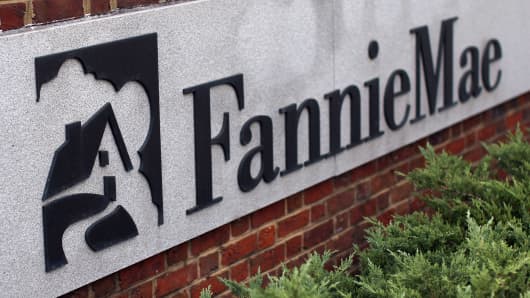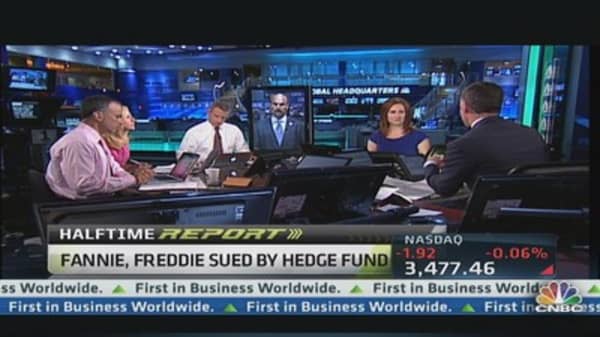If the United States government winds up having to give up tens of millions to hedge funds invested in companies rescued with taxpayer funds, you can be sure there will be a good deal of populist outcry. But much of it will be misplaced, aimed not at the bureaucrats whose schemes set this motion in process, but at the hedge fund managers who took advantage of the bureaucrats' short-sightedness.
The lawsuit filed Monday by Perry Capital, a hedge fund, argues that the government is taking too much of the profits of Fannie Mae and Freddie Mac, the failed mortgage giants. Perry, and a handful of other hedge funds, own preferred shares in the companies that they think should be worth not-so-small fortunes if only the government would stop hogging all the profits.
It's hard to find someone to root for in this fight. Either a bunch of wealthy hedge fund guys make a mint by riding along with a government bailout, or government bureaucrats get to make a hash out of the notion of the rule of law while Congress and the President appropriate the money to their latest world improvement schemes. Some choice.
It all started back in September 2008, when the United States government seized Fannie Mae and Freddie Mac on the grounds that the companies needed seizing good and hard. Both companies were, technically at least, solvent and still paying their bills. But Hank Paulson (then the Treasury Secretary), James Lockhart (then the head of a new federal agency called the Federal Housing Finance Administration), Ben Bernanke (still the chairman of the Federal Reserve), had decided that both companies needed to be placed into a strange status called "conservatorship" for the sake of financial stability and the support of the housing market.
(Read also:Investors Sue Government Over Fannie, Freddie)
A few months earlier in July, Congress had passed the Housing and Economic Recovery Act, which created the FHFA and authorized the Treasury to organize a rescue of Fannie and Freddie. Under the act, the director of the FHFA could seize the mortgage companies by declaring his agency the conservator or receiver if he found they were in financial distress, under-capitalized, breaking the law or monkeying around with the books.
It's clear that under the law that the government could have seized 100 percent of the companies. But in order to avoid an accounting rule that would have recognized the debt of Fannie and Freddie as debt of the United States (which it is), the government declared it was leaving just over 20 percent of the company in public hands.
These shares immediately tanked because a great many people understood that the private sector's stakes in companies that required $187 billion of taxpayer money shouldn't really be worth anything. Allowing the shares to live on in the private sector was an open invitation to moral hazard.
The 2008 law authorized the FHFA director to put each of Fannie and Freddie into either a "conservatorship" or a "receivership." Neither concept is defined in the 2008 law, perhaps because it was so hastily put together that no one bothered to really figure out how it would work. But the general understanding was that conservatorship would mean that the company would be kept alive, at least for a while, and perhaps someday privatized once its financial soundness had been restored (if that proved possible). Receivership meant that the company would be quickly unwound.
Conservatorship was chosen, or so it seems, because things were falling apart everywhere the bureaucrats looked. Lehman Brothers was in its death throes, Merrill Lynch was having spasms, AIG had fallen into the derivatives abyss it had spent a decade digging for itself, and Citigroup was bewildered about its own balance sheet. Conserving something seemed like the right move to the people who would later knit together TARP to conserve everything.
If you've been following the course of human events since 2008, you know what happened next. Every financial company that the government rescued from the brink of disaster in 2008 and 2009 started making money again. Fannie and Freddie, which once had a hand in a little over a third of the mortgage market, now run the show (along with a couple of other government entities) with close to 100 percent of the market. And now they're making money, big money, again.
The survival of Fannie and Freddie, however, was a costly thing. Between 2008 and 2012, Fannie and Freddie saw mark-to-market accounting losses and were unable to pay the dividends they owed the Treasury. The Treasury responded by purchasing more senior preferred stocks and allowed the companies to make dividends out of those proceeds. These sales, however, increased the value of the Treasury's shares, increasing the dividends owed. And, yes, that is, indeed, just as ridiculous as it sounds.
In the interim, Perry Capital purchased preferred shares that had been purchased by banks, largely because regulators treated them as safe assets. Perry believed that the preferred shares could be worth many times what they were trading even after the government had taken its cut, which was originally slated to be a dividend of 10 percent of the outstanding value of the company.
The government revised its share purchase agreements with Fannie and Freddie last August, requiring them to pay Treasury a quarterly dividend equal to all of their net worth above a capital reserve amount that declines to zero in 2018. Basically, despite owning just less than 80 percent of the company, Treasury demanded 100 percent of the profits.
So you can see Perry's point. This stinks. They bought the shares the government had decided to let continue to float in the public market on the understanding that they'd be treated fairly, not crushed out in a bit of minority shareholder exploitation that would make the worst corporate raider blush.
To hear Perry's lawyers at Gibson Dunn tell the tale, because the regulators chose to call what they did in 2008 a conservatorship rather than a receivership, they implicitly gave away rights to the owners of the stub of preferred and common shares that remained outstanding.
"HERA established very specific rules about the government's limits and obligations under conservatorship. Investors had every right to expect these rules to be followed. If the government wanted to assume the powers of receivership, it could have chosen that course," Gibson Dunn partner and former Soliciter General of the U.S. Ted Olson said in a statement Monday.
That's at least a stretch. The 2008 mostly seems to treat these two terms as basically interchangeable, often employing them together as "conservator or receiver." The basic grounds for the government choosing to appoint a conservator or receiver over Fannie or Freddie are exactly the same. I'm not sure anyone writing this law or the Congressmen voting for it had a very clear distinction in mind.
One crucial area where the law does distinguish between the two roles is that the receiver is granted some additional powers. A conservator is only authorized to take actions "necessary to put the regulated entity in a sound and solvent condition" and "appropriate to carry on the business of the regulated entity and preserve and conserve the assets and property of a related entity." When acting as a receiver, however, the regulators "shall place the regulated entity in liquidation and proceed to realize upon the assets of the regulated entity in such a manner" as the regulators deem appropriate.
What Perry's lawyers are essentially arguing in their case is that a 2012 amendment to deal between the companies and Treasury amounts to drawn out liquidation Fannie and Freddie—something that should only happen if the government choose to call its bailout a receivership.
On this point, however, the Perry brief seems to get things backward. In a quick liquidation of Fannie and Freddie under a receivership, the point would have been to maximize the value of assets in a sale so that creditors—perhaps including the preferred shareholders—could be repaid. The receiver acts as a neutral party dividing up the assets between claimants (typically because the entity taken into receivership isn't eligible to declare bankruptcy). In a conservatorship, however, all the powers of directors, shareholders and officers get transferred to the conservator.
Another point where the Perry brief oversteps is when it applies that the government should be obligated to allow the company to buy back the government's preferred shares.
"By 2012, the fact that the Companies were returning to financial health and would soon be able to position themselves to redeem the Government Preferred Stock was—or at least should have been—obvious to Treasury and the FHFA. But instead of taking steps to aid that process, Treasury and the FHFA entered into the Third Amendment, which ensured that Treasury would be the only beneficiary of the companies' profitability and that the companies would be wound down," the Perry complaint filed Monday says.
Take a step back and you can more easily see a weakness of this line of argument. The decision to put Fannie and Freddie into conservatorship did not create any legal obligation to ever let them out of it. It did not require the government to preserve value for extant holders of the common or preferred shares. In fact, since all of these shares would have been completely worthless without the conservatorship, it's fair enough to ask why they shouldn't be worthless even with the conservatorship.
To put it differently: the rescue of Fannie and Freddie was aimed at accomplishing the larger public purpose of supporting the residential housing market. It was undertaken with the public funds—and without the public funds both companies would have been worth nothing at all. It stands to reason then that the Treasury should be the primary beneficiary of any profits.
But probably not the sole beneficiary. The choice to leave a 20 percent stub of outstanding should constrain the government. It shouldn't be permitted to ruthlessly cut those shares off from benefitting from Fannie's and Freddie's improved health. The benefit of keeping them off balance sheet just comes with the cost of not treating the remaining shares as if they didn't really exist. As long as the companies still exist and are making money, the existing non-government shareholders should be treated fairly.
None of this is to say the government should keep Fannie and Freddie as wards of the state perpetually. That is an invitation to even more political shenanigans than existed when they were secretly (or implicitly) wards. If we can figure out how to make them private companies again—truly private, with no monopoly power in the housing market and no implicit government guarantee—we should do that. If not, then eventual wind-down may be the only choice here. That will irk the hedge funds who own the shares but they will need to accept that they have no right to owning a privatized company unwillingly backed by taxpayers.
—By CNBC's John Carney. Follow me on Twitter @Carney





